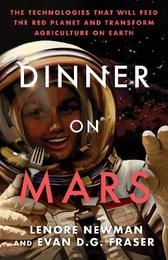
|
Dinner On Mars: The Technologies That Will Feed the Red Planet and Transform Agriculture on Earth
Paperback / softback
Main Details
| Title |
Dinner On Mars: The Technologies That Will Feed the Red Planet and Transform Agriculture on Earth
|
| Authors and Contributors |
By (author) Lenore Newman
|
|
By (author) Evan D. G. Fraser
|
| Physical Properties |
| Format:Paperback / softback | | Pages:256 | | Dimensions(mm): Height 216,Width 140 |
|
| Category/Genre | Popular science |
|---|
| ISBN/Barcode |
9781770416628
|
| Classifications | Dewey:664 |
|---|
| Audience | |
|---|
|
Publishing Details |
| Publisher |
ECW Press,Canada
|
| Imprint |
ECW Press,Canada
|
| Publication Date |
3 November 2022 |
| Publication Country |
Canada
|
Description
From Impossible Burgers to lab-made sushi, two witty, plugged-in food scientists explore leading-edge AgTech for the answer to feeding a settlement on Mars - and nine billion Earthlings too Feeding a Martian is one of the greatest challenges in the history of agriculture. Will a Red Planet menu involve cheese and ice cream made from vats of fermented yeast? Will medicine cabinets overflow with pharmaceuticals created from engineered barley grown using geothermal energy? Will the protein of choice feature a chicken breast grown in a lab? Weird, wonderful, and sometimes disgusting, figuring out "what's for dinner on Mars" is far from trivial. If we can figure out how to sustain ourselves on Mars, we will know how to do it on Earth too. In Dinner on Mars, authors Fraser and Newman show how setting the table off-planet will supercharge efforts to produce food sustainably here at home. For futurists, sci-fi geeks, tech nuts, business leaders, and anyone interested in the future of food, Dinner on Mars puts sustainability and adaptability on the menu in the face of our climate crisis. "Feeding a human colony on the Red Planet would be a staggering challenge. But the technologies we'd use there could help humanity vastly improve how we produce food here - on Earth - providing more nutrition more fairly with far less damage to our planet's essential natural systems than today's food technologies. This is a wonderfully creative and entertaining book that's packed with vital insights on every page. Newman and Fraser are master storytellers, and in Dinner on Mars they offer a feast of science, foresight, history, and imagination that satisfies our hunger for hope in a time of crisis." - Thomas Homer-Dixon, Executive Director, Cascade Institute, author of Commanding Hope: The Power We Have to Renew a World in Peril
Author Biography
Lenore Newman is the Canada Research Chair in Food Security and the Environment at the University of the Fraser Valley. She is the author of the acclaimed Speaking in Cod Tongues: A Canadian Culinary Journey and the award-winning Lost Feast: Culinary Extinction and the Future of Food. She divides her time between Vancouver and Roberts Creek, BC. Evan D.G. Fraser is the Director of the Arrell Food Institute at the University of Guelph. He is the author of Beef: The Untold Story of How Milk, Meat, and Muscle Shaped the World and Empires of Food: Feast, Famine, and the Rise and Fall of Civilizations. He lives in Guelph, ON, with his wife and three children.
Reviews"Newman and Fraser's thought experiment of what people would eat in their imaginary Martian settlement of BaseTown also serves as a lesson in how we might improve food systems here on Earth." -- National Post "The book is an eccentric conversation between two wise prophets, Evan D.G. Fraser and Lenore Newman, about what's wrong with our planet's agriculture and how it could be right...Rather than setting out a dull prescription, Fraser and Newman deliver a raft of saucy solutions, taken from their impassioned debates over Zoom during lockdown." -- Broadview Magazine "Highly recommended, fascinating, and extremely relevant to life on Earth, Dinner on Mars is a book I'll be recommending to many of my friends." -- Tamaranth's Creative Writing blog "This culinary cosmic outing is as creative as it is informative." -- Publishers Weekly, starred review "Feeding a human colony on the Red Planet would be a staggering challenge. But the technologies we'd use there could help humanity vastly improve how we produce food here -- on Earth -- providing more nutrition more fairly with far less damage to our planet's essential natural systems than today's food technologies. This is a wonderfully creative and entertaining book that's packed with vital insights on every page. Newman and Fraser are master storytellers, and in Dinner on Mars they offer a feast of science, foresight, history, and imagination that satisfies our hunger for hope in a time of crisis." -- Thomas Homer-Dixon, Executive Director, Cascade Institute, author of Commanding Hope: The Power We Have to Renew a World in Peril
|